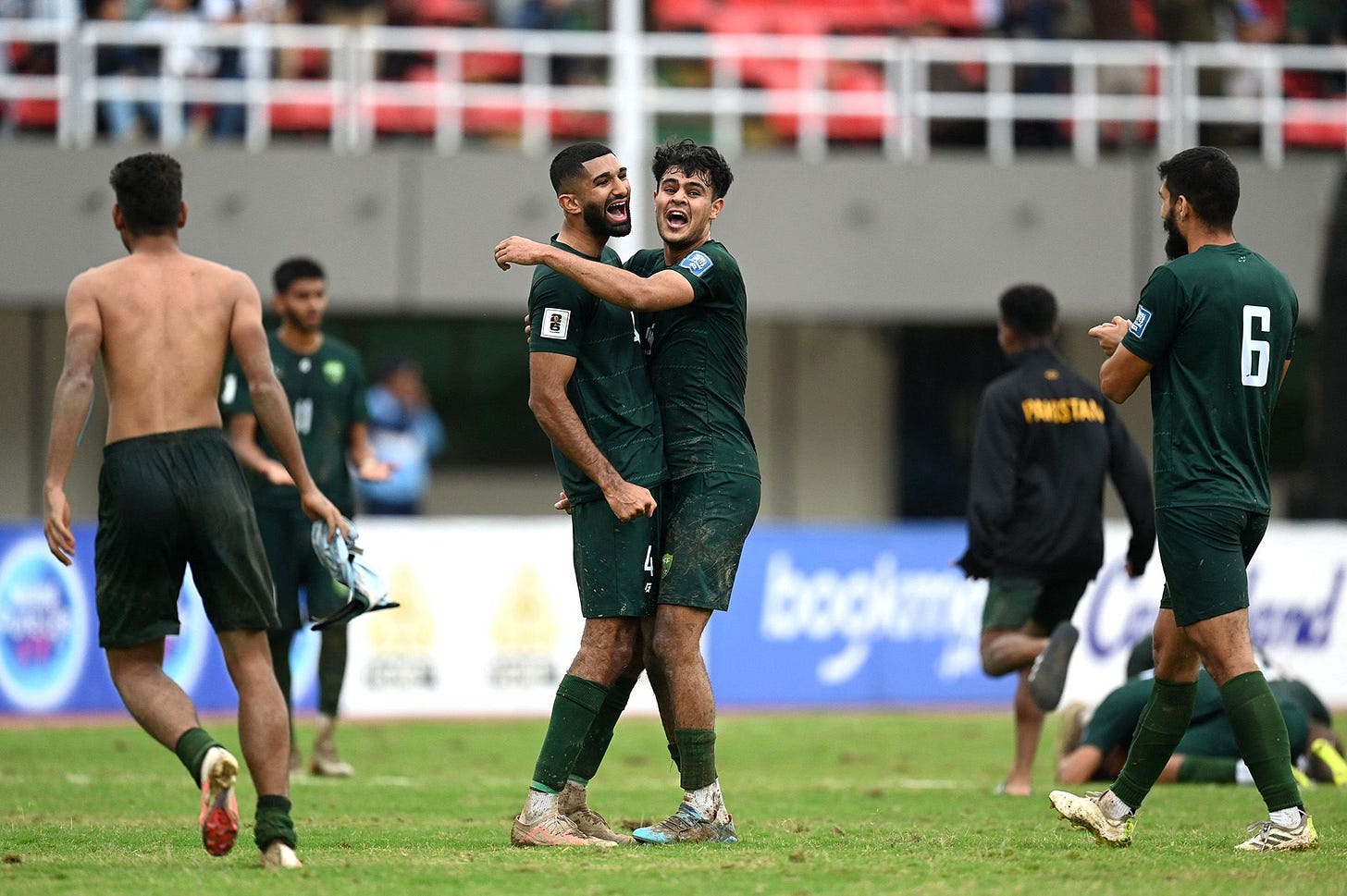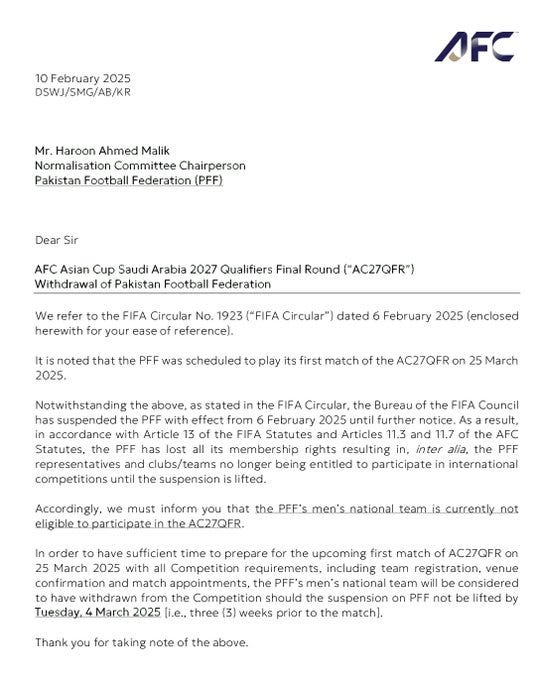Once is unfortunate, twice could be coincidence, but to be banned by FIFA for a third time in less than eight years means that Pakistan has achieved something unique in football. Added to the growing list that contains 2017 and 2021 is now the year 2025. The first suspension lasted five months, the second 14, and it remains to be seen for how long the latest sanction lasts for. All have been damaging.
People are fond of saying that China or India are Asia’s biggest underachievers, especially given Indonesia’s improvements of late. Yet a quick look at South Asia shows a country that is home to 240 million people and ranked 198 in the world (it is customary now to state the identity of the two teams on either side of that ranking to illustrate just how dire the situation is but that is just too depressing). There is no functioning national league and from 2015 to 2023 the men’s national team did not even play a home game. It really is a lost decade.
It didn’t have to be this way. That 2023 game could have been a turning point. That was when Pakistan overcame Cambodia in the first round of qualification for the 2026 World Cup. It meant a first appearance in the second round and six much-needed group games. Amid the celebrations in Islamabad was a sense of what could be.
Instead, less than 18 months later, there is another ban. Without getting too much into the details, they all are connected. In 2015, the long-serving and controversial head of the Pakistan Football Federation (PFF) Syed Faisal Saleh Hayat was elected to serve another term amid accusations of vote-rigging and more besides.
The Infighting Intensifies
There was plenty of fallout and in a bid to restore order, the Lahore High Court got involved which constituted, according to FIFA, third-party interference. In October 2017, the world governing body issued a ban as “a result of the fact that the PFF offices and its accounts remain in control of a court-appointed administrator, which constitutes a violation of the PFF obligations to manage its affairs independently and without influence from any third parties in accordance with the FIFA Statutes.”
The ban was lifted in 2018 after the PFF was back in control but there were still issues. Ashfaq Hussein became president in an election that was not recognised by FIFA. In 2019, it installed a Normalisation Committee (NC) in Lahore, whose remit was to organise new elections.
In 2021, Ashfaq and other officials from the PFF stormed and then occupied the federation’s headquarters in Lahore —still being used by the committee— leading to another ban that lasted for 14 months. The NC is still in place, organising elections has proven to be more difficult and complex than many think and is connected to the latest ban.
In January, a PFF Congress was presented by FIFA with amendments to the constitution that would have widened the criteria for candidates who wanted to run for election. It was rejected by 19 out of 25 members. Down came ban number three. “The PFF has been suspended with immediate effect due to its failure to adopt a revision of the PFF Constitution that would ensure truly fair and democratic elections and thereby fulfil its obligations as mandated by FIFA as part of the ongoing normalisation process of PFF,” FIFA wrote. “The suspension will only be lifted subject to the PFF Congress approving the version of the PFF Constitution presented by FIFA and the AFC.”
What Now?
Until the amendments are accepted, the ban is going to stay in place. It means that the little football that there is, is going to ground to a halt. The women’s team was preparing for a first ever qualification campaign for the 2026 Asian Cup. The men have a March 25 game against Syria, the first of the group stage in the 2027 Asian Cup qualification. The AFC has given a deadline of March 4 if they want to get the green light. This was outlined in the letter below.
On Monday, however, the PFF announced a pre-emptive withdrawal from those games in a clear sign it was not even going to attempt to meet the deadline. "The Pakistan Football Federation (PFF) regrets to inform the football fraternity that the national team will be unable to participate in the final round of the AFC Asian Cup Saudi Arabia 2027 Qualifiers,” it said in a statement.
The announcement is not one that suggests the PFF is in a mood to listen to the AFC or FIFA, even though the federation relies on funds from these governing bodies more than most. Whatever money comes in from sponsors and the private sector, which has dried up to minimal amounts, is going to be reduced even further.
Contrast this with the Republic of Congo. The FA of the African country was banned on the same day as Pakistan for third-party interference. The response was a little different. Congo Sports Minister Hugues Ngouelondele told a press conference that authorities will “very quickly get in touch with the leaders of CAF and FIFA to discuss the lifting of the sanction”.
On the face of it, at least, there is a willingness in Congo to get the ban lifted as soon as possible. It is hard to see a similar attitude over in Lahore where it seems that some officials aren’t that bothered about whether they are banned or not as long as they are in power.
Not for the first time, the third time in fact, fans are the ones who have to sit while nothing happens. More than most, Pakistan football needs leadership, vision and compromise. Instead, it is frozen out of the world game.




